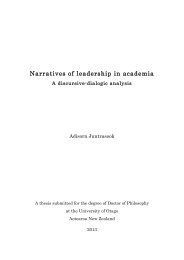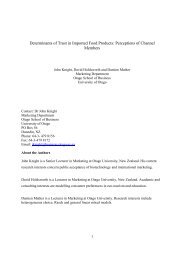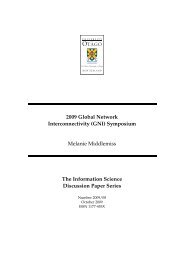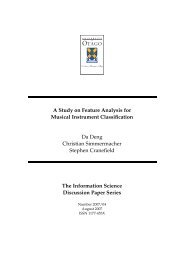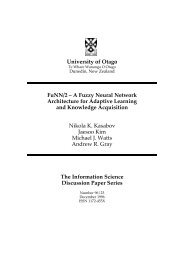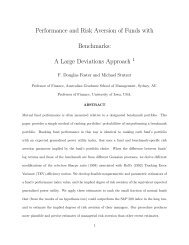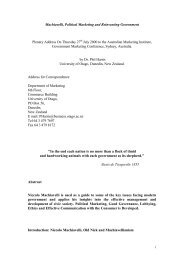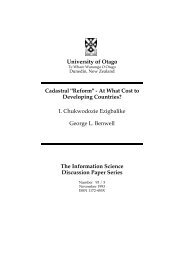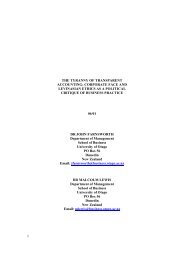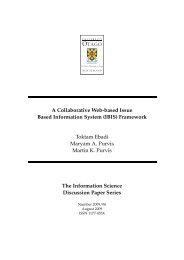Where is R2P grounded in international law? Anne-Marie Judson A ...
Where is R2P grounded in international law? Anne-Marie Judson A ...
Where is R2P grounded in international law? Anne-Marie Judson A ...
Create successful ePaper yourself
Turn your PDF publications into a flip-book with our unique Google optimized e-Paper software.
that the present Covenant does not recognize such rights or that it recognizes them to<br />
a lesser extent”. 315<br />
PROHIBITED VIOLATIONS<br />
The articles that are absolutely prohibited at all times <strong>in</strong>clude Article 6 which refers to<br />
the right to life (Article 6(1), and the sentence of death may only be imposed for the<br />
most serious of crimes <strong>in</strong> accordance with the <strong>law</strong> <strong>in</strong> force at the time of the<br />
comm<strong>is</strong>sion of the crime and not contrary to the prov<strong>is</strong>ions of th<strong>is</strong> Covenant. (Article<br />
6 (2). No state may derogate from any obligations assumed under the Convention on<br />
the Prevention and Pun<strong>is</strong>hment of the Crime of Genocide (Article 6 (3). Anyone<br />
sentenced to death may have the right to seek pardon, amnesty or commutation,<br />
Article 6 (4). The sentence of death may not be imposed on those under the age of 18<br />
or on women who are pregnant (Article 6 (5). Lastly th<strong>is</strong> Covenant may not be used to<br />
delay or prevent the abolition of capital pun<strong>is</strong>hment. 316<br />
Under Article 7 it <strong>is</strong> a violation to subject anyone to torture, cruel, <strong>in</strong>human or<br />
degrad<strong>in</strong>g treatment <strong>in</strong>clud<strong>in</strong>g be<strong>in</strong>g subjected without consent to medical or scientific<br />
experimentation 317 and Article 7 provides for the protection aga<strong>in</strong>st slavery. It <strong>is</strong> a<br />
violation to subject anyone to slavery or the slave trade (para 1) and no one shall be<br />
subjected to servitude (para 2). Article 11 provides for protection of impr<strong>is</strong>onment on<br />
the grounds of an <strong>in</strong>ability to pay or fulfil a contractual obligation. Article 15 holds<br />
that it <strong>is</strong> a violation to hold someone guilty of a crime on account of any act or<br />
om<strong>is</strong>sion that did not constitute a crim<strong>in</strong>al offence under national or <strong>in</strong>ternational <strong>law</strong><br />
at the time it was committed. It <strong>is</strong> also a violation to impose on someone a heavier<br />
penalty than one that was applicable at the time when the crim<strong>in</strong>al offence was<br />
committed. Article 16 states it <strong>is</strong> a violation not to recognize every person a person<br />
before the <strong>law</strong>. Article 18 protects freedom of thought, conscience and religion,<br />
<strong>in</strong>clud<strong>in</strong>g the right to adopt a religion or belief of one’s choice and freedom either<br />
<strong>in</strong>dividually, <strong>in</strong> community with others or <strong>in</strong> private or public, to manifest one’s<br />
religion or belief <strong>in</strong> worship, observance, practice and teach<strong>in</strong>g. Other prohibitions<br />
under Article 18 <strong>in</strong>clude the right not to be subjected to coercion to impair one’s<br />
315 See page 4 <br />
316 See page 4, part iii, articles 6 (1) to 6 (6) <br />
317 See page 5 <br />
<br />
99



